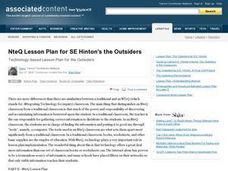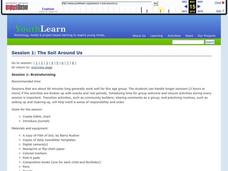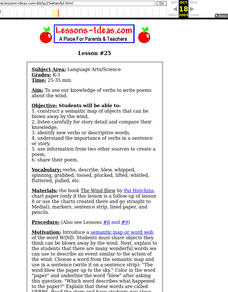Curated OER
Jack Be Nimble
Students recite the poem "Jack Be Nimble". In this poetry lesson, students read the poem and discuss other action words to use instead of jump. They rewrite the poem using their own name and a new action word.
Curated OER
Dragonwings: Evaluate Chapters 10-12
As your class finishes the novel Dragonwings, use these culminating projects. A vocabulary list is given for chapters eleven and twelve and either an epitaph or letter activity concludes the book. The final project consists of creating a...
Curated OER
N is for Natural State
For any pupils who live in the state of Arkansas, this would be a fabulous educational experience to help them get to know their state better. Through the use of activities in literature, art, mathematics, science, social studies, and...
Curated OER
Yummy Adjectives
Fourth graders recognize and brainstorm descriptive adjectives to use in their writing. They work in pairs to take a taste and touch test and record their adjectives used to describe the food and knick-knacks on handout. This is a great...
Curated OER
Noun-mania
Students study nouns and verbs. In this parts of speech instructional activity, students use laminated pattern letters and write out as many nouns to spell out the word "n-o-u-n." They then repeat the activity with verbs.
Curated OER
Grow a Musical Instrument
Music, culture, social studies, and plant growth all in one! Kids explore the various type of traditional African instruments that are made out of gourds. They then grow their own gourds and use them to create a wide variety of...
Curated OER
The Legendary Raptors
How are raptors and airplanes alike? Combine science and language arts in this fun and interactive project. Young scientists research the animal in order to design their own aircraft, and compete in a contest for farthest, fastest, and...
Curated OER
NteQ Lesson Plan for S.E. Hinton's The Outsiders
Explore literature through the completion of reading comprehension worksheets in class. After reading the classic book, The Outsiders by S.E. Hinton, middle schoolers review each chapter by completing study questions and story webs....
EngageNY
Close Reading of Thank You, Mr. Falker: Identifying the Superpowers of Reading
Third graders read excepts from the story, Thank You, Mr. Falker in order to gain practice in understanding an unfamiliar story by focusing on the details. They use a worksheet, embedded in the plan, which directs them to certain...
Perkins School for the Blind
Accessible Labels
When you're blind it is extremely important to be able to navigate your environment in as independent a way as possible. This idea isn't a lesson, but it is a great way to foster independent mobility and literacy skills while making the...
Center Science Education
Model a Moving Glacier
Glaciologists in your class make models of glaciers to simulate how they move down a valley, and then they use it to test any aspect of glacier movement. Not only is this a vivid visual of how these monsters of ice flow, but it is also...
Baylor College
Infectious Disease Case Study
Small groups of life science learners look at Allison's symptoms and discuss a diagnosis. They use a chart of illnesses and draw symptom clues from an envelope to determine what illness she has. A instructional activity like this gives...
Curated OER
Bear Hunt Obstacle Course
Students complete an obstacle course. In this following directions lesson, students read the book Going on a Bear Hunt. Students learn how to maneuver through the obstacle course, walk through the obstacle course and then...
Curated OER
Freckle Juice
Students complete activities with the book Freckle Juice by Judy Blume. In this literature lesson, students read chapter one and brainstorm adjectives for the four main characters. They make a page of vocabulary words and...
Curated OER
Awesome Animals
Sixth graders write descriptive narratives about animals. In this descriptive writing lesson, the teacher models how to write a paragraph with interesting sensory words and exciting verbs. Students choose a picture of an animal they want...
Curated OER
Living in our Family
Students study the language, heritage, traditions, and customs of other cultures by becoming member of simulated families in other parts of the world.
Curated OER
Selfless Service and The Giving Tree - Building Ethical Conscience
Upper elementary schoolers investigate philanthropy and selflessness by reading a children's book. In this ethics lesson plan, they read The Giving Tree by Shel Silverstein, and research Mahatma Gandhi's troublesome, yet inspiring, life....
Curated OER
Colonial Vacation Planner
Looking for a good lesson on the Colonial Period for your upper-elementary class? Then, this lesson is for you! They use website designs, U.S. travel publications, and maps to plan a family vacation to states which were part of the...
Institute of Electrical and Electronics Engineers
Statue Display Tower
Sometimes engineering problems that seem easy prove to be more challenging than imagined. Present your class with the challenge to build a functional display tower to support a statue using only the supplies available in class while...
Curated OER
Classifying Conundrum
Fourth graders identify plant characteristics from different environments and communicate that information in different ways. They use a simple scheme to classify Utah plants and animals and make observations and record them in a...
Curated OER
"The Soil Around Us" Project
Young geographers collect samples of different kinds of soil to match to the soil terms in Barry Rudner's rhyming book Filet of Soil: dirt, mud, dust, soot, etc. They start a glossary for the project on index cards or large sheets...
Hyperion
Crispin: The Cross of Lead
Avi's Crispin: The Cross of Lead is the focus of a teacher's guide that provides background information on 14th Century England, a plot summary, discussion questions, activities, and resource links. A must-have for those who use this...
Curated OER
Beginning Synonyms and Antonyms-Multiple Choice-Nouns
In this synonym/antonym worksheet using nouns, students are given one set of nouns and select the best synonym for each word. Next, students repeat the activity with a new set of words, selecting the best antonym.























